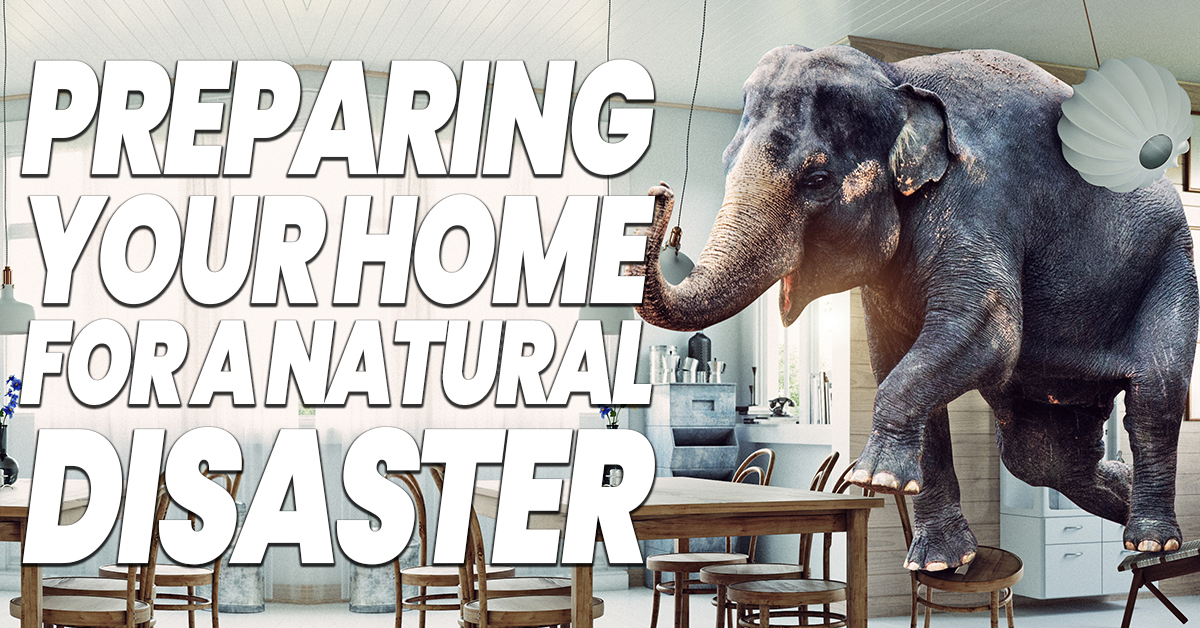Preparing Your Home for a Natural Disaster

Preparing Your Home for a Natural Disaster
There are many variables in preparing a home for a natural disaster. The type of disaster in question, for example, will have a major impact. Will you need sandbags to minimize flooding damage or plywood panels to cover windows from flying debris?
There are, however, some basics every homeowner can undertake to make sure they are prepared for almost any eventuality. Many of these involve good routine home maintenance practices and having the appropriate supplies. Here are some of the steps you can take to make sure your home is ready for a natural disaster.
Keep Your Roof Properly Maintained
High winds can create a chain reaction of issues to cause damage to a home. Making sure your home has solid roofing is a good place to start in preparing for a natural disaster. This can minimize wind and water damage that can become extensive and expensive.
Keep Gutters Cleared
Clogged gutters and downspouts can cause a myriad of problems in heavy rains or even freezing rain and snow. Clogged gutters can create damage to roofs, siding and even the foundation.
Keep Trees Trimmed
Trees need to be kept properly trimmed to allow air to move through easier and minimize damage from falling dead or diseased limbs. Make sure trees are trimmed far enough in advance of high winds so the cut limbs don’t become projectiles.
Food and Supplies
Every home should always have a minimum of three days of non-perishable food and water. Along with food, an emergency kit should include a battery operated radio, batteries, flashlights, can opener, blankets, pillows and medical supplies and medicines.
Cash
In a power outage, credit card and ATM machines could become useless. Make sure you always have at least some cash on hand in such circumstances.
Cooking Source and Generator
A propane grill and portable gas generator can be invaluable following a natural disaster. Make sure you have at least one backup propane tank and spare gas for the generator. Make sure grills and generators are only operated in the open air.
Of course, you also want to make sure your homeowners’ insurance is up-to-date annually. Contact one of our independent insurance agents for a no-obligation insurance review and quote. Get the peace of mind you deserve by contacting us today.
Do you have questions about your insurance? Find an insurance agent near you with our Agent Finder
Search All Blogs
Search All Blogs
Read More Blogs
Step Back in Time: 7 Small Towns with Unique American Atmospheres
Discover America’s most atmospherically unique small towns.
Beyond the Bar: Customer Service Lessons from the Best Bartenders
Unlock customer service secrets from your favorite bartender.
Your Safety Net Has a Safety Net: Understanding the Life Insurance “Free Look” Period
Discover your life insurance policy’s “free look” period.
From Edsel to Yugo: Three Automotive Flops That Made History
The biggest blunders in automotive history.
Stay or Go? Why Improving Your Current Home Might Be Your Best Move Yet
Love your home, don’t leave it! Discover why improving beats moving.
The Unforgettable Eight: Women Who Captured Our Hearts
Meet the eight women who are loved by all.
Elevate Your Enterprise: 11 Smart Ways to Boost Business Professionalism
Boost your business’s professionalism without breaking the bank.
Lightening the Load: A Guide to Decluttering for Your Loved Ones
Declutter for peace of mind, yours and theirs.
Smart Car Buying: Beyond the Sticker Price
Unlock the hidden costs of car ownership.
6 Simple Steps to Supercharge Your Home Security
Simple, affordable ways to protect your home.









